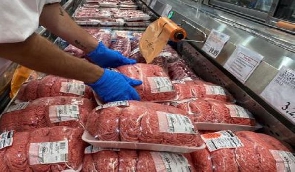 the Ghana spends millions of cedis on importing meat that can be produced right here
the Ghana spends millions of cedis on importing meat that can be produced right here
The Ashaiman Main Market Butchers Association has decried the importation of meat products into Ghana, arguing that the situation is crippling their business activities. They fear losing their business for the reason that about 80% of their customers preferred cheap imported meat to fresh ones on the local market.
As a result, some traders in the meat market have abandoned their tables in search of other business opportunities, while others have spread out to vantage points within the market and other new markets in the Ashaiman municipality in order to meet sales targets.
“One of our major problems is the imported meat that is affecting our business. Locally cut fresh cow leg costs GH¢15, but the imported one cost GH¢5. Most of our customers are chop bar operators, and because they want more profit they now go to the cold stores and buy imported meat,” Yakubu Ibrahim and Abubakari Mohammed, members of the association, told the B&FT in an interview.
They bemoaned that some cow parts which include the intestine, head, legs and others are being imported onto the market. “That foreign meat is affecting our market too much,” they said, urging government to intervene in the matter by encouraging local livestock farming as well as consumption of fresh cow meat on the market.
Even as the local butchers cut and sell the meat, the cows are imported from the neighboring countries such as Burkina Faso, Niger, Mali, Ivory Coast and others – and to them, the challenge of accessing foreign exchange, the CFA, is hampering their ability to purchase cows.
The local butchers wish to venture into cattle farming but do not have the financial means. An informal survey points to a requirement of about GH¢80,000 to GH¢100,000 to commence cattle farming. Currently, a calf costs between GH¢2,000 to GH¢3,000 each; and a sucking calf also costs between GH¢1,000 to GH¢1,500.
“There is no support coming from government and so we feel rejected,” the local butchers lamented, leveraging the opportunity to appeal to government to nudge banks and other financial institutions to supporting their business. “We have applied for loans at the banks and the NBSSI but to no response.”
Revamp meet processing industry
Alhaji Moro Akakade, National Chairman of Livestock Breeders and Traders Association of Ghana, also called for revamping the meat industry – especially the Bolgatanga Meat Processing Factory, to create jobs for the youth and help develop the nation. He recalled the Bolgatanga meat processing plant collapsed in the 1970s due to the economic decline that led to lower demand for meat throughout the country.
To him, as a sector that currently employs over 2,000 youth and holds great potential to employ more, a concerted effort must be made to invest in the livestock sector so the country can save money and produce more meat to meet demand.
Alhaji Akakade said the country spends millions of cedis on importing meat that can be produced here in the country.
Research data
Data from the Ministry of Food and Agriculture shows that 90 percent of meat products consumed in the country are imported from Burkina Faso and Europe. It revealed that Ghana’s meat industry produces just 10 percent of the meat it consumes. According to the research, the livestock subsector contributed only 1.3% to Ghana’s GDP.